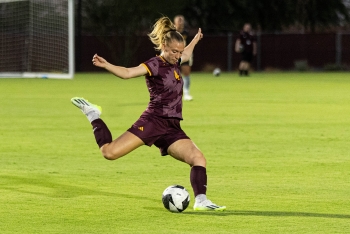Editor’s note: This story is part of a series of profiles of notable fall 2023 graduates.
Just a year after he appeared on the list of the most prominent graduates of 2022 from Arizona State University NewsSoccer star and class wizard Liske Carlier returns to the 2023 roster after graduating with a master’s degree in clinical exercise physiology.
Lieske Carleer, an All-Pac-12 Conference selection as a member of the Arizona State University women’s soccer team, has been named a College of Health Solutions Distinguished Alumnus for the fall of 2023.
Download the full image
Carlier, from Winterswijk, Netherlands, is honored with the College of Health Solutions Award Distinguished graduate.
An additional year of athletic eligibility due to the COVID-19 pandemic gave Carlier the opportunity to pursue a master’s degree through the university’s accelerated master’s program. If it weren’t for this extra time, she would have already returned to the Netherlands to play football.
Carleer was named a second-team All-Pac-12 selection. However, she gives credit to others when asked about receiving the award.
“It was nice to get recognition for my own efforts; “Also, a couple of my other teammates who made the same team, and it was really cool to see that at the Pac-12 level,” Carlier said. “People also recognize the quality we have on our team here at ASU.”
Humble, strong, hardworking and perceptive are some of the few words in a long list of words used to describe Carlier.
“You can’t do it alone,” she said. “You have to work together, on and off the field and also in school and in my career. It’s the same thing.”
Question: What was your “aha” moment when you realized you wanted to study the field you majored in?
Answer: So I said, ‘I have an extra year of eligibility. I’ll see if I can do something about that.’ Then came the Clinical Exercise Physiology program, and I’m very interested in everything to do with the body and how the body responds to exercise and how you can improve that for performance or health. This was a master’s A great way to delve deeper into the healthy side of exercise.
Q: Why did you choose ASU?
a: ASU’s coach came to visit the European Championships I was playing in when I was 16 years old. He saw me play and liked what he saw and invited me. I wasn’t really planning to travel to the US at all. He asked me to visit him, and I said, “Oh, I might as well see what it’s about.” Then I came here, saw the facilities and how you can combine high-level settings with your degree and the flexibility that it offers. I really liked what I saw and saw it as a great opportunity to develop myself personally, academically and in my sport.
Q: What is something you learned while at ASU—in the classroom or otherwise—that surprised you or changed your perspective?
a: I’ve learned a lot about myself. About my body, what I need and how to perform optimally. Mentally too, like what I need from others and how to communicate what I need and making sure people know that too. I was surprised by the fact that I learned a lot outside the field about myself and how I function as a human being.
Q: Who is the professor who taught you the most important lesson while at ASU?
a: doctor. (Donna) StrikeShe is the head of the CEP program where I currently work. It has been a blessing to work with her throughout my Masters studies. She was very flexible with me and my schedule with soccer, all the games I played, and also the Masters schedule in general.
Q: What is your best advice for those still in school?
a: Get as much experience as possible and make as many contacts as possible. Because the connections and experience you get will help you decide what you want to do.
Q: What is your favorite place on campus, whether to study, meet friends, or just think about life?
a: I usually go to the coffee shop (Fillmore Coffee Company and Infusion Coffee Company) right off campus. I just meet people at the café, drink coffee, talk, then do my homework and have a good time.
Q: What are your plans after graduation?
a: The goal is still to play professional football. I hope to start that, next January. I’ve been interviewing for jobs, but not for a healthcare career, but for a football career at the moment.
Q: If someone gave you $40 million to solve one problem on our planet, what would you solve?
a: I won’t go into much depth about it because it’s pretty heavy. But it is the wars in Ukraine, Palestine and Israel. These people are in danger.
Story by Aidan Hansen, communications assistant, College of Health Solutions.

